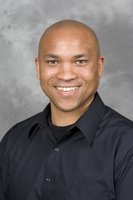
Chad Jenkins was recently awarded the prestigious Sloan Research Fellowship, the oldest and one of the most competitive fellowship programs in the United States. Chad's extraordinary work in human-robot interaction and robot learning, with a specific focus on robot learning from human demonstration, led to his inclusion in this elite group.
"The Sloan Research Fellowships support the work of exceptional young researchers early in their academic careers, and often at pivotal stages in their work," says Paul L. Joskow, President of the Alfred P. Sloan Foundation. "I am proud of the Foundation's rich history in providing the resources and flexibility necessary for young researchers to enhance their scholarship, and I look forward to the future achievements of the 2009 Sloan Research Fellows." Selection procedures for the Sloan Research Fellowships are designed to identify those who show the most outstanding promise fundamental contributions to new knowledge. "I am very honored to be selected as a Sloan fellow," said Chad. "It is always great to receive such recognition. I believe it is a sign of the strong and supportive environment cultivated by our department as well as the great collaborations I have had throughout my career. In addition, the intellectual freedom of Sloan awards is an excellent opportunity to pursue bolder exploratory research directions that might be difficult to fund traditionally."
The fellowships are awarded by the Alfred P. Sloan Foundation to honor and promote the science of outstanding researchers early in their academic careers. The 118 winners are faculty members at 61 colleges and universities in the United States and Canada who are conducting research at the frontiers of physics, chemistry, computational and evolutionary molecular biology, computer science, economics, mathematics and neuroscience. They receive grants of $50,000 for a two-year period to pursue whatever lines of inquiry are of most interest to them. This money will be used to support the work of Chad and his students in robot learning and human-robot interaction.
Aside from the monetary aspect of the fellowships, less tangible benefits have been cited by former Fellows. The early recognition of distinguished performance which the fellowships confer, after years of arduous preparation, was said to be immensely encouraging and a stimulus to personal and career development.
The Sloan Research Fellowships have been awarded since 1955. Since then, 38 Sloan Research Fellows have gone on to win the Nobel Prize in their fields; and 14 have received the Fields Medal, the top honor in mathematics.
